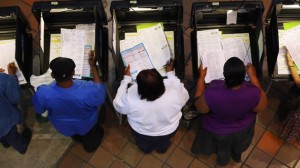On The Morning of the Election (Or, "Your Abstention Will Not Protect You: Voting and Radical Black Feminist Politics")
By C. Riley Snorton and Mecca Jamilah Sullivan
 Today marks the conclusion of the voting period, which will settle numerous electoral decisions, including various seats in the Congress, local and state referenda, and most notably, the Presidential seat. Yesterday, we read a number of eloquent arguments about why some people are choosing to abstain from voting. And while we respect our friends and the decisions they are making, we are troubled by the suggestion that abstention from voting marks a step toward an ethical higher ground. In our view, this is simply not the case.
Today marks the conclusion of the voting period, which will settle numerous electoral decisions, including various seats in the Congress, local and state referenda, and most notably, the Presidential seat. Yesterday, we read a number of eloquent arguments about why some people are choosing to abstain from voting. And while we respect our friends and the decisions they are making, we are troubled by the suggestion that abstention from voting marks a step toward an ethical higher ground. In our view, this is simply not the case.
Voting, in and of itself, is neither wholly system-changing nor inherently conciliatory; it is one available gesture in the series of actions through which those of us committed to an anti-oppressive politics live our lives. Therefore, we wanted briefly to sketch what might characterize the relationship between voting and having black feminist (progressive or even radical) politics. This is not some last-ditch ploy to get our dissenting friends to the polls. We simply want to clarify that voting is not a declaration of an apologist or accommodationist politic. Rather, it is a strategic action that makes up a small part of a full political life.
Today, on the morning of this election, we find it crucial to make three central points:
- We do not need to agree with everything a political candidate espouses to cast a vote in her favor. Voting is not an unequivocal endorsement—of a particular candidate or of the systems that structure our participation as “citizens.”
- Voting is participating in a process that allows us to select figures with whom we would prefer to engage. That is to say, voting allows us to have some say in the parameters of future political struggle. It lets us decide with whom we want to struggle. And struggle we must.
- Voting is not an end, or even a means to an end. Black feminist politics are far more expansive than electoral politics. They’ve had to be. Black feminist politics are what allows us— as young black queer and trans feminists—to fight to have liveable lives, to cherish our own survival and delight in the miracles of making it to the next year, day, hour. Voting does not interrupt our black feminist politics any more than it vanquishes the myriad structural and sociohistorical inequities that make those politics necessary.
In other words, to vote is to practice a strategic embodiment. It is to lodge one’s body in a deeply flawed system as part of a larger commitment to developing a world we all might be better able to live in. As feminists of color, we know that politics neither begin nor end with the casting of the ballot. But, for us, right now, the ballot must be part of the process. And so, when the dust settles on this particular moment in history and the two of us return home from the polls, we know that we will continue to voice dissent, to engage in acts of self-care, and to practice a set of politics anchored in the belief that liberation is something we must fight—in all possible ways—to attain.
———-
C. Riley Snorton and Mecca Jamilah Sullivan are Editorial Collective members of The Feminist Wire
For more, please see past posts from TFW’s Forum on Voting, organized by collective member Heather Laine Talley: https://thefeministwire.com/2012/10/introduction-to-tfw-voting-forum/




28 Comments